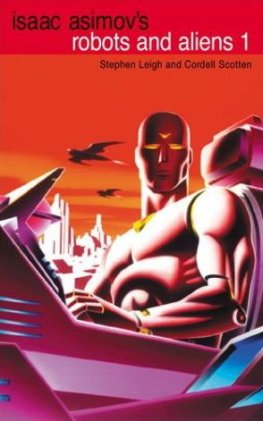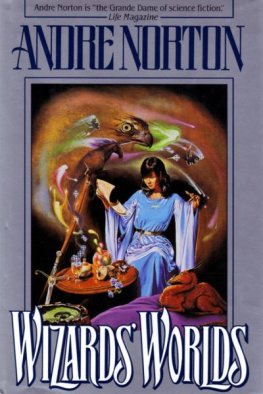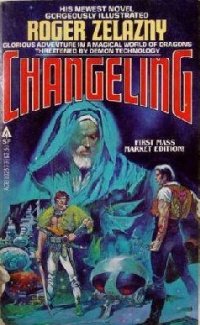Stephen Leigh - Changeling
Here you can read online Stephen Leigh - Changeling full text of the book (entire story) in english for free. Download pdf and epub, get meaning, cover and reviews about this ebook. year: 2001, publisher: Ibooks, Inc., genre: Science fiction. Description of the work, (preface) as well as reviews are available. Best literature library LitArk.com created for fans of good reading and offers a wide selection of genres:
Romance novel
Science fiction
Adventure
Detective
Science
History
Home and family
Prose
Art
Politics
Computer
Non-fiction
Religion
Business
Children
Humor
Choose a favorite category and find really read worthwhile books. Enjoy immersion in the world of imagination, feel the emotions of the characters or learn something new for yourself, make an fascinating discovery.
- Book:Changeling
- Author:
- Publisher:Ibooks, Inc.
- Genre:
- Year:2001
- ISBN:1-596-87265-9
- Rating:5 / 5
- Favourites:Add to favourites
- Your mark:
- 100
- 1
- 2
- 3
- 4
- 5
Changeling: summary, description and annotation
We offer to read an annotation, description, summary or preface (depends on what the author of the book "Changeling" wrote himself). If you haven't found the necessary information about the book — write in the comments, we will try to find it.
Changeling — read online for free the complete book (whole text) full work
Below is the text of the book, divided by pages. System saving the place of the last page read, allows you to conveniently read the book "Changeling" online for free, without having to search again every time where you left off. Put a bookmark, and you can go to the page where you finished reading at any time.
Font size:
Interval:
Bookmark:
Stephen Leigh
Changeling
To Megen and Devon
who are already exploring their own sense of wonder and who have given new meaning to mine.
Robots And Aliens
by Isaac Asimov
You may have noticed (assuming that you have read my robot stories and novels) that I have not had occasion to discuss the interaction of robots and aliens. In fact, at no point anywhere in my writing has any robot met any alien. In very few of my writings have human beings met aliens, in fact.
You may wonder why that is so, and you might suspect that the answer would be, I dont know. Thats just the way I write stories, I guess. But if that is what you suspect, you are wrong. I will be glad to explain just why things are as they are.
The time is 1940
In those days, it was common to describe Galactic Federations in which there were many, many planets, each with its own form of intelligent life. E. E. (Doc) Smith had started the fashion, and John W. Campbell had carried it on.
There was, however, a catch. Smith and Campbell, though wonderful people, were of northwest European extraction and they took it for granted that northwest Europeans and their descendants were the evolutionary crown and peak. Neither one was a racist in any evil sense, you understand. Both were as kind and as good as gold to everyone, but they knew they belonged to the racial aristocracy.
Well, then, when they wrote of Galactic Federations, Earthmen were the northwest Europeans of the Galaxy. There were lots of different intelligences in Smiths Galaxy but the leader was Kimball Kinnison, an Earthman (of northwest European extraction, Im sure). There were lots of different intelligences in Campbells Galaxy, but the leaders were Arcot, Wade, and Morey, who were Earthmen (of northwest European extraction, Im sure).
Well, in 1940, I wrote a story called Homo Sol, which appeared in the September 1940 issue of Astounding Science Fiction. I, too, had a Galactic Federation composed of innumerable different intelligences, but I had no brief for northwest Europeans. I was of East European extraction myself and my kind was being trampled into oblivion by a bunch of northwest Europeans. I was therefore not intent on making Earthmen superior. The hero of the story was from Rigel and Earthmen were definitely a bunch of second-raters.
Well, Campbell wouldnt allow it. Earthmen had to be superior to all others, no matter what. He forced me to make some changes and then made some himself, and I was frustrated. On the one hand, I wanted to write my stories without interference; on the other hand, I wanted to sell to Campbell. What to do?
I wrote a sequel to Homo Sol, a story called The Imaginary, in which only the aliens appeared. No Earthmen. Campbell rejected it; it appeared in the November 1942 issue of Superscience Stories.
Then inspiration struck. If I wrote human/alien stories, Campbell would not let me be. If I wrote alien-only stories, Campbell would reject them. So why not write human-only stories. I did. When I got around to making another serious attempt at dealing with a Galactic society, I made it an all-human Galaxy and Campbell had no objections at all. Mine was the first such Galaxy in science fiction history, as far as I know, and it proved phenomenally successful, for I wrote my Foundation (and related) novels on that basis.
The first such story was Foundation itself, which appeared in the May 1942 Astounding Science Fiction. Meanwhile, it had also occurred to me that I could write robot stories for Campbell. I didnt mind having Earthmen superior to robots-at least just at first. The first robot story that Campbell took was Reason, which appeared in the April 1941 Astounding Science Fiction. Those stories, too, proved very popular, and presuming upon their popularity, I gradually made my robots better and wiser and more decent than human beings and Campbell continued to take them.
This continued even after Campbells death, and now I cant think of a recent robot story in which my robot isnt far better than the human beings he must deal with. I think of Bicentennial Man, Robot Dreams, Too Bad and, most of all, I think of R. Daneel and R. Giskard in my robot novels.
But the decision I made in the heat of World War II and in my resentment of Campbells assumption have stayed with me. My Galaxy is still all-human, and my robots still meet only humans.
This doesnt mean that (always assuming I live long enough) its not possible I may violate this habit of mine in the future. The ending of my novel Foundation and Earth makes it conceivable that in the sequel I may introduce aliens and that R. Daneel will have to deal with them. Thats not a promise because actually I havent the faintest idea of whats going to happen in the sequel, but it is at least conceivable that aliens may intrude on my close-knit human societies.
(Naturally, I repel, with contempt, any suggestion that I dont introduce aliens into my stories because I cant handle them. In fact, my chief reason for writing my novel The Gods Themselves was to prove to anyone who felt he needed the proof, that I could, too, handle aliens. No one can doubt that I proved it, but I must admit that even in The Gods Themselves, the aliens and the human beings didnt actually meet face-to-face.)
But lets move on. Suppose that one of my robots did encounter an alien intelligence. What would happen?
Problems of this sort have occurred to me now and then but I never felt moved to make one the basis of a story.
Consider- How would a robot define a human being in the light of the three laws. The First Law, it seems to me, offers no difficulty: A robot may not injure a human being, or through inaction, allow a human being to come to harm.
Fine, there need be no caviling about the kind of a human being. It wouldnt matter whether they were male or female, short or tall, old or young, wise or foolish. Anything that can define a human being biologically will suffice.
The Second Law is a different matter altogether: A robot must obey orders given it by a human being except where that would conflict with the First Law.
That has always made me uneasy. Suppose a robot on board ship is given an order by someone who knows nothing about ships, and that order would put the ship and everyone on board into danger. Is the robot obliged to obey? Of course not. Obedience would conflict with the First Law since human beings would be put into danger.
That assumes, however, that the robot knows everything about ships and can tell that the order is a dangerous one. Suppose, however, that the robot is not an expert on ships, but is experienced only in, let us say, automobile manufacture. He happens to be on board ship and is given an order by some landlubber and he doesnt know whether the order is safe or not.
It seems to me that he ought to respond, Sir, since you have no knowledge as to the proper handling of ships, it would not be safe for me to obey any order you may give me involving such handling.
Because of that, I have often wondered if the Second Law ought to read, A robot must obey orders given it by qualified human beings
But then I would have to imagine that robots are equipped with definitions of what would make humans qualified under different situations and with different orders. In fact, what if a landlubber robot on board ship is given orders by someone concerning whose qualifications the robot is totally ignorant.
Must he answer, Sir, I do not know whether you are a qualified human being with respect to this order. If you can satisfy me that you are qualified to give me an order of this sort, I will obey it.
Font size:
Interval:
Bookmark:
Similar books «Changeling»
Look at similar books to Changeling. We have selected literature similar in name and meaning in the hope of providing readers with more options to find new, interesting, not yet read works.
Discussion, reviews of the book Changeling and just readers' own opinions. Leave your comments, write what you think about the work, its meaning or the main characters. Specify what exactly you liked and what you didn't like, and why you think so.










